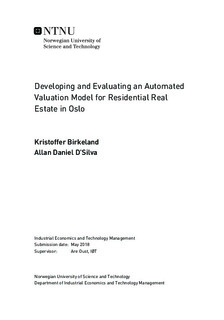Developing and Evaluating an Automated Valuation Model for Residential Real Estate in Oslo
Master thesis
Permanent lenke
http://hdl.handle.net/11250/2575523Utgivelsesdato
2018Metadata
Vis full innførselSamlinger
Sammendrag
In this thesis, we develop an automated valuation model (AVM) for the residential real estate market, and evaluate it by analysing its accuracy on all dwellings sold in the first quarter of 2018 in Oslo, Norway. We design the AVM to utilise data on dwellings' transactions and characteristics by leveraging the concepts of stacked generalisation and comparable market analysis. In particular, we combine four novel ensemble learning methods with a repeat sales method and tailor the data selection for each value estimate. By developing our AVM, we aim to aid in creating a more efficient real estate market and to further the research of applying machine learning to real estate finance.
We calibrate and evaluate the model for the residential real estate market in Oslo, by producing out-of-sample value estimates for the 1 979 dwellings sold in Q1 2018. This yields highly promising results; the AVM achieves a median absolute percentage error (MdAPE) of 5.4%, and more than 96% of the dwellings are estimated within 20% of their actual selling price. This is comparable to the accuracy of local estate agents in Oslo, and we observe similar performances by the industry leader for AVMs in the U.S.
These results demonstrate that our AVM is a viable tool for both industrial and private applications. Furthermore, we find our novel approach of applying stacked generalisation to residential real estate valuation to be successful and encourages the research into the application of machine learning to the field of real estate finance.
